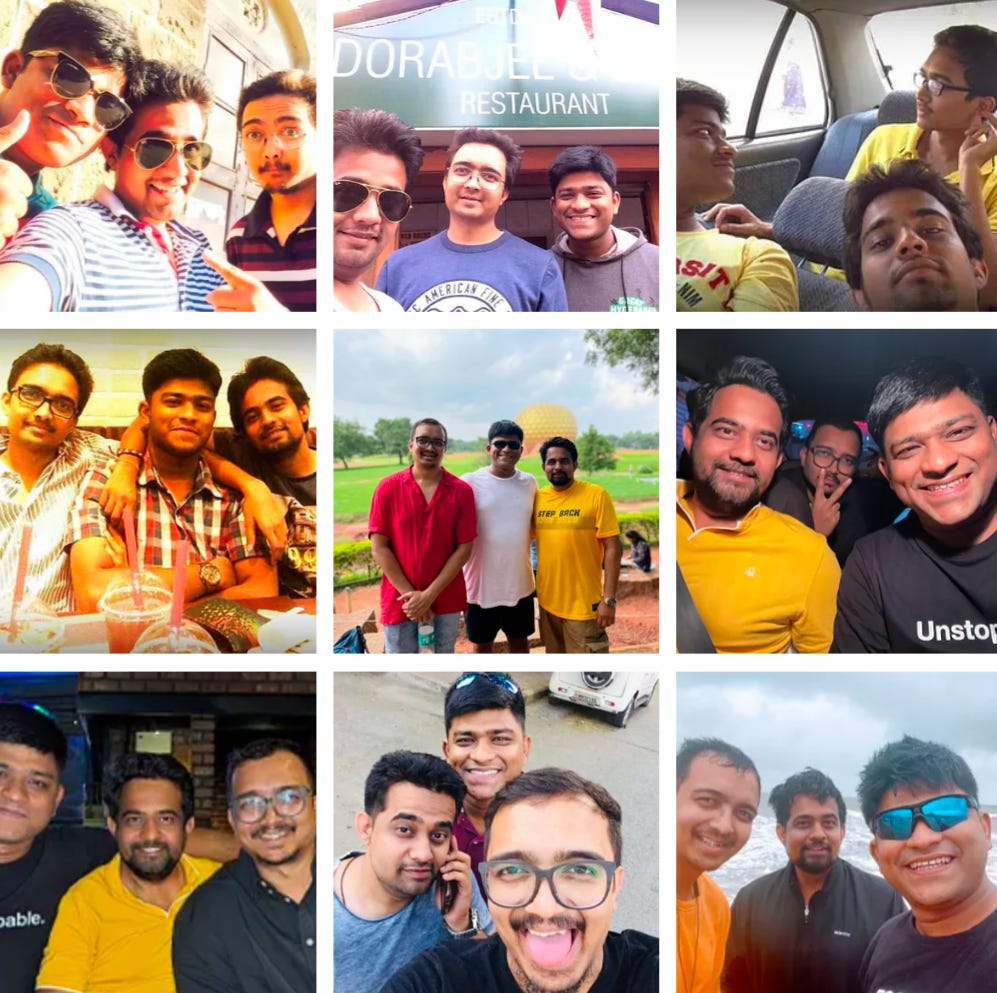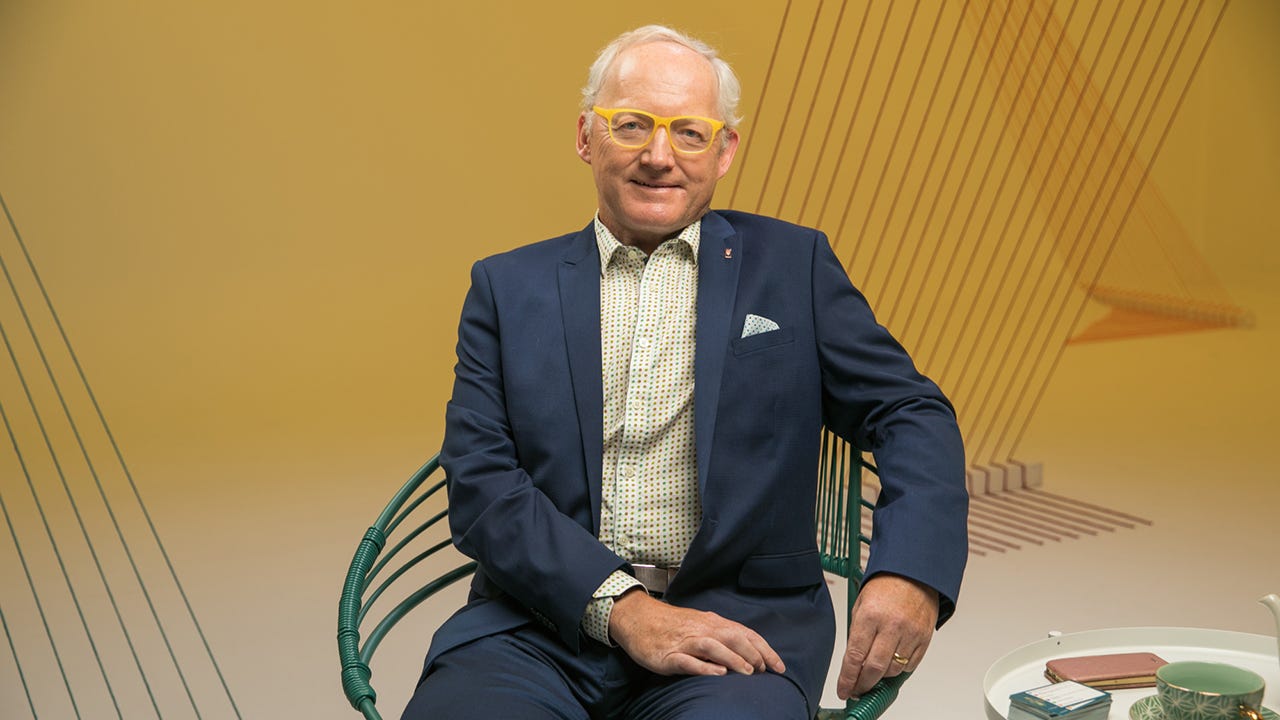Discover hip X comical
hip X comical

hip X comical
Author: Aminuddin Shroff
Subscribed: 0Played: 0Subscribe
Share
© Aminuddin Shroff
Description
Ever wondered what happens when the clean lines of Bauhaus collide with a healthy dose of humour and curiosity? Welcome to Hip X Comical, a podcast delving into the intriguing world of design, the art of minimalism, the power of thought, and the everyday adventures of life. Your host navigates these topics with a unique blend of insight and wit. Craving more? Explore our blog and other creative endeavours at www.hipxcomical.in.
aminuddinshroff.substack.com
aminuddinshroff.substack.com
30 Episodes
Reverse
This podcast provides an extensive overview of Jim Collins's seminal business text, Good to Great, detailing the rigorous research that underpins its findings on enduring corporate success. The text outlines the five core concepts necessary for organizations to transition from merely good to great, including Level 5 Leadership, which mandates a mix of extreme personal humility and fierce professional will. Other key principles discussed are prioritizing people before strategy (First Who... Then What), confronting difficult realities (The Stockdale Paradox), focusing on a simplified core mission (The Hedgehog Concept), and building momentum through consistency (The Flywheel). Furthermore, the excerpts suggest that these research-based principles are not limited to business but can be directly applied to personal and professional life to achieve individual excellence. This is a public episode. If you'd like to discuss this with other subscribers or get access to bonus episodes, visit aminuddinshroff.substack.com/subscribe
This podcast highlights an extensive argument contrasting the behaviours and mindsets of the amateur and the professional, advocating for a systematic, disciplined approach to work and progress. It posits that the professional succeeds by treating work as a continuous process and a cold, hard system rather than relying on inspiration or talent, highlighting the necessity of showing up daily regardless of motivation. The text outlines three core ideas for professional progress, including using pain and reflection as a feedback loop for system improvement, embracing the anti-aspiration of discipline over dramatic genius, and prioritising leverage and judgment over mere labour or trading time for money. Furthermore, it incorporates supporting quotes from figures like Naval Ravikant and Steven Pressfield to reinforce the central idea that turning professional is the only effective way to overcome internal "Resistance" and achieve sustained results. This is a public episode. If you'd like to discuss this with other subscribers or get access to bonus episodes, visit aminuddinshroff.substack.com/subscribe
This podcast delivers insights focused on building sustainable personal and professional systems through targeted action and philosophical principles. It emphasises that achievements like earning a Generative AI certificate are merely tools, whereas the real power lies in leveraging that knowledge to produce measurable output. A core tenet is the discipline of less, advocating that success comes from achieving perfection on a few variables rather than spreading effort across many mediocre details, which relates to Naval Ravikant's idea of focusing on principles over tactics. Furthermore, the text stresses the importance of fostering reliable, honest relationships, describing friends like brothers as essential, non-depreciating assets and an audit of one's character. Ultimately, the material challenges the reader to build a strong foundation and to embrace radical trust by questioning what unnecessary anxieties they carry. This is a public episode. If you'd like to discuss this with other subscribers or get access to bonus episodes, visit aminuddinshroff.substack.com/subscribe
The podcast offers an extensive review of Toby Walsh's non-fiction book, 2062: The World that AI Made, which explores the potential impact of Artificial Intelligence on society over the next forty years. Walsh, an AI professor, presents a balanced perspective, detailing both the promising advancements and the significant challenges that AI could bring across various sectors, including healthcare, education, and employment. The review highlights key themes such as the ethical imperative in AI development, the changing nature of work, and the crucial role of data privacy. Ultimately, the book serves as a call to action for individuals and leaders to engage thoughtfully with AI's progression, advocating for the cultivation of uniquely human skills and informed civic participation to shape a desirable future. This is a public episode. If you'd like to discuss this with other subscribers or get access to bonus episodes, visit aminuddinshroff.substack.com/subscribe
This podcast is on "Extreme Ownership: Your Path to Career Flow" explores key principles for professional advancement and personal growth. It emphasises the concept of extreme ownership, urging individuals to proactively solve problems and act like a leader rather than passively waiting for promotion. The text also highlights the importance of regular reflection, encouraging readers to pause and assess their progress to ensure they remain on their desired career path. Furthermore, it discusses the humiliation phase as a necessary precursor to achieving a state of flow in creative or deep work, suggesting that initial struggles are part of the learning process. The article reinforces these ideas with quotes from Simon Sinek and Stephen McCranie, stressing that leadership is a behaviour and that repeated failures are integral to mastery. This is a public episode. If you'd like to discuss this with other subscribers or get access to bonus episodes, visit aminuddinshroff.substack.com/subscribe
The podcast offers a comprehensive overview of how Artificial Intelligence (AI) is reshaping the professional landscape, emphasizing that it acts as a force multiplier rather than a direct replacement for human labour. It highlights the impending automation of repetitive tasks, including those in compliance and legal documentation, urging individuals to focus on building systems that leverage AI for increased productivity. The sources also detail the essential skills for 2030, categorising them into technical competencies for working alongside AI, such as prompt engineering and data literacy, and distinctly human-centric abilities that AI cannot replicate, including critical thinking, creativity, and emotional intelligence. Finally, the text underscores the importance of intuitive thought and mental discipline as crucial assets in an AI-driven future, advocating for a strategic approach to personal and professional development. This is a public episode. If you'd like to discuss this with other subscribers or get access to bonus episodes, visit aminuddinshroff.substack.com/subscribe
This podcast explores the nature of introversion, distinguishing it from shyness and highlighting its unique strengths in the workplace and personal life. They discuss how modern work environments often favour extroverted traits and offer strategies for introverts to thrive, such as managing energy, networking authentically, and excelling in meetings. The texts also address common misconceptions about introverts and provide actionable advice for self-improvement and career advancement, including techniques for combating imposter syndrome and overcoming negative self-talk. This is a public episode. If you'd like to discuss this with other subscribers or get access to bonus episodes, visit aminuddinshroff.substack.com/subscribe
This podcast highlights "Insight and Life's True Riches," offers a reflective perspective on personal growth and well-being. It explores three core ideas: that true wealth is defined by the freedom to control one's time, not merely by accumulation; that overcoming stagnation requires taking a single, small step rather than a grand plan; and that the ultimate reward of patience is the character forged through the waiting process, not just the outcome itself. The source further enhances these concepts with two insightful quotes emphasising the value of quiet introspection and the power of sustained, consistent effort. It concludes by prompting readers to consider a small, actionable step towards a goal they are pursuing, encouraging forward momentum and personal agency. This is a public episode. If you'd like to discuss this with other subscribers or get access to bonus episodes, visit aminuddinshroff.substack.com/subscribe
The podcast offers an in-depth overview of Tim Ferriss's book, Tools of Titans, a comprehensive collection of insights from highly successful individuals. It explores the book's structure, which organises advice into 'Healthy', 'Wealthy', and 'Wise' sections, designed for flexible reading. The document highlights key recurring themes found within the interviews, such as the importance of morning rituals, effective questioning, and embracing discomfort. It also discusses leadership lessons that can be gleaned from the "Titans'" habits, promoting self-awareness and strategic focus. Ultimately, the text demonstrates how the book's actionable advice can be applied to everyday life for personal and professional growth. This is a public episode. If you'd like to discuss this with other subscribers or get access to bonus episodes, visit aminuddinshroff.substack.com/subscribe
"Horizons Broadened: Perseverance, Self-Sufficiency, and Contentment," is an insightful podcast offering guidance on personal development. It focuses on three core ideas: the importance of perseverance through consistent effort to achieve long-term success; the cultivation of self-sufficiency to foster true independence and resilience in an increasingly dependent world; and the pursuit of inner contentment, advocating for a focus on essential needs over endless acquisition. The piece reinforces these concepts with relevant quotes from figures like Michael Jordan and Charlotte Brontë, providing contextual explanations for their wisdom. Finally, it concludes with a thought-provoking question designed to encourage readers to reflect on their own capacity for self-reliance. This is a public episode. If you'd like to discuss this with other subscribers or get access to bonus episodes, visit aminuddinshroff.substack.com/subscribe
This podcast outlines a framework for achieving enhanced understanding and effective decision-making through three core principles. It first introduces Radical Transparency, advocating for open and direct communication to resolve issues swiftly by eliminating hidden agendas. Following this, Radical Open-mindedness is presented as the crucial practice of actively seeking dissenting views and challenging one's own assumptions to foster continuous learning and adaptation. Finally, the concept of Being Hyperrealist encourages perceiving situations precisely as they are, beyond superficial narratives, to make accurate assessments and formulate effective strategies. The document further includes reflective quotes and a thought-provoking question, encouraging readers to re-evaluate their perspectives and embrace profound intellectual shifts. This is a public episode. If you'd like to discuss this with other subscribers or get access to bonus episodes, visit aminuddinshroff.substack.com/subscribe
(26/52|25)Richard Dawkins's The Selfish Gene, first published in 1976, is a seminal work that revolutionized how we understand evolution. Far from being a dry academic treatise, it's a gripping, thought-provoking exploration of life from a gene's-eye view, written with a clarity and wit that makes complex scientific concepts accessible to all. Dawkins, a British evolutionary biologist, ethologist, and influential popular science writer, has consistently championed scientific understanding and rational thought throughout his career, often engaging in robust debates against creationism and religious dogma. The Selfish Gene stands as a cornerstone of his legacy, establishing the gene as the fundamental unit of natural selection.The Author: Richard DawkinsBorn in Nairobi, Kenya, in 1941, Richard Dawkins moved to England with his family at a young age. He studied zoology at the University of Oxford, where he earned his doctorate under the guidance of Nobel laureate Nikolaas Tinbergen. The Selfish Gene was his first book, and its groundbreaking perspective catapulted him to international recognition. He later held the Charles Simonyi Chair for the Public Understanding of Science at Oxford, a position he used to advocate for science and critical thinking. Dawkins is renowned for his ability to translate intricate scientific ideas into compelling narratives, making them understandable and engaging for a broad audience. His subsequent works, such as The Blind Watchmaker and The God Delusion, further solidified his reputation as a leading voice in evolutionary biology and atheism.Key Takeaways from The Selfish GeneThe core argument of The Selfish Gene is deceptively simple yet profoundly impactful: the unit of natural selection is not the individual organism or the species, but the gene itself. Organisms, including humans, are effectively "survival machines" or "robot vehicles" designed and built by genes to ensure their own propagation.Here are the key takeaways that resonate throughout the book:* Genes are the immortal replicators: While individual organisms are mortal, genes, as discrete units of heredity, can potentially live on indefinitely by being copied and passed down through generations. Evolution, therefore, is about the differential survival of these genes.* Selfishness at the genetic level: The term "selfish" in the title doesn't imply conscious intent or malice on the part of the gene. Instead, it describes a gene's inherent tendency to act in ways that maximize its own survival and replication, often at the expense of other genes or even the individual organism.* Apparent altruism explained by gene selfishness: One of the book's most brilliant insights is how it explains seemingly altruistic behaviors in the animal kingdom. Actions like a mother bird sacrificing herself for her chicks, or a worker bee dying to protect the hive, can be understood as strategies that ultimately benefit the genes shared by related individuals (kin selection). By helping kin, an organism is indirectly helping copies of its own genes survive.* The concept of the "Extended Phenotype": While not fully developed until his later work, Dawkins introduces the idea that a gene's influence can extend beyond the physical body of the organism. Examples include beaver dams, bird nests, or even spiderwebs – these are "phenotypic effects" that serve the gene's interest in survival and propagation.* Evolutionary Stable Strategies (ESS): Dawkins uses game theory to explain how certain behavioral patterns, even those that appear cooperative or restrained, can emerge as stable outcomes in a population. The "Tit-for-Tat" strategy in the Prisoner's Dilemma, for instance, demonstrates how reciprocal altruism can be a highly successful evolutionary strategy for genes.* The introduction of "memes": In the final chapter, Dawkins extends the concept of replication beyond biology to cultural transmission, coining the term "meme." A meme is an idea, belief, fashion, or cultural practice that spreads from mind to mind, analogous to how genes spread through biological reproduction. This concept opened up new avenues for understanding cultural evolution.* Human agency and the rebellion against genetic programming: Despite emphasizing the pervasive influence of genes, Dawkins also offers a glimmer of hope. He argues that humans, with their developed consciousness and foresight, have the unique capacity to understand their genetic programming and, crucially, to rebel against it. We can consciously choose to be altruistic and cooperative, transcending our inherent genetic predispositions.Leadership Lessons from a Gene's PerspectiveWhile The Selfish Gene isn't a leadership manual in the traditional sense, its core principles offer fascinating insights that can be applied to leadership and organizational dynamics:* Focus on the Fundamental Unit: A leader who understands the fundamental "units" driving their organization or team will be more effective. Just as genes are the fundamental units of biological evolution, what are the core drivers, values, or even individual motivations that truly perpetuate the success of your group?* Long-Term Vision over Short-Term Gains: Genes, despite their "selfishness," are playing a long game – ensuring their replication across generations. Leaders should similarly prioritize long-term sustainability and growth over immediate, fleeting successes. This often means making decisions that benefit the collective future, even if they require short-term sacrifices.* The Power of Cooperation for Individual Benefit: The book demonstrates how cooperation, even seemingly altruistic acts, can arise from underlying self-interest. In leadership, fostering a collaborative environment often leads to greater overall success, which in turn benefits each individual within the team. Leaders can design systems where individual success is intertwined with collective achievement.* Understanding "Survival Strategies": Organizations, like biological systems, operate with various "survival strategies." Leaders need to identify these strategies – both explicit and implicit – and assess their effectiveness. Are they truly serving the long-term "replication" of the organization's mission and goals?* The Influence of "Memes" in Organizational Culture: The concept of memes is incredibly relevant to organizational culture. Ideas, values, practices, and even jokes can spread like memes within a team. Leaders play a crucial role in shaping and propagating positive, productive "memes" and identifying and mitigating destructive ones.* The Importance of Adaptability and "Genetic Arms Races": Evolution is a continuous arms race. In the business world, this translates to constant innovation and adaptability. Leaders must foster a culture that embraces change, learns from failures, and continuously seeks to improve its "survival mechanisms" in a competitive landscape.* The Potential for Conscious Override: Just as humans can choose to rise above their genetic predispositions, leaders can choose to transcend purely self-serving motives. True leadership often involves making ethical decisions, prioritizing the well-being of the team or society, and fostering a sense of purpose beyond individual gain.Implementation in Everyday LifeWhile The Selfish Gene primarily deals with biological evolution, its conceptual framework offers thought-provoking perspectives on everyday human behavior and society:* Understanding Human Motivation: The gene-centered view can provide a lens through which to understand various human motivations, from parental love (kin selection) to tribalism (group selection, albeit a byproduct of gene-level selection). It encourages a more critical examination of why we behave the way we do.* Empathy and Altruism as Conscious Choices: If we are indeed "born selfish" in a genetic sense, then consciously choosing generosity and altruism becomes even more profound and laudable. The book implicitly urges us to cultivate these traits, recognizing that our advanced cognitive abilities allow us to transcend purely genetic imperatives.* Critical Thinking about Societal Norms: The meme concept allows us to critically examine the spread of ideas, beliefs, and behaviors in society. Why do certain trends catch on? Why are some ideas more resilient than others? Understanding memes can help us be more discerning consumers and producers of cultural information.* Parenting and Education: Recognizing the deep-seated drives our genes instill can inform parenting and educational approaches. While genes provide a foundation, conscious nurturing and education are vital in shaping individuals who can make informed, ethical choices beyond simple genetic programming.* Navigating Relationships: Understanding the interplay of genetic self-interest and cooperative strategies can shed light on dynamics in relationships. It doesn't reduce love or friendship to mere genetic calculations, but it provides a framework for appreciating the complex motivations at play and the evolutionary benefits of reciprocal kindness and trust.* Personal Growth and Self-Awareness: By understanding that our behaviors might be rooted in ancient genetic programming, we gain a degree of self-awareness. This awareness can empower us to challenge habitual reactions, cultivate desired traits, and consciously shape our own actions and character, rather than blindly following genetic "dictates."In conclusion, The Selfish Gene is not just a book about biology; it's a profound commentary on life itself. Richard Dawkins, with his incisive intellect and captivating prose, invites us to look at the world from a radical new perspective. It's a challenging read for some, as it can feel unsettling to consider oneself a mere "survival machine." Yet, it's also incredibly liberating, as it empowers us with the knowledge that we, as conscious beings, possess the remarkable ability to understand and, if we choose, to defy t
This podcast explores various philosophical perspectives on how to live a fulfilling life and humanity's relationship with nature, primarily drawing from Stoicism and environmental ethics.At its core, the concept of eudaimonia, often translated as human flourishing or happiness, is central to many philosophies discussed. For Aristotle, eudaimonia is achieved through "doing and living well" by exhibiting virtue in accordance with reason, which is seen as the unique essence of human beings. This involves the proper development of one's highest capabilities and intense involvement in meaningful activities. Ancient thinkers like Socrates and Plato also argued that true happiness is not found in pleasure or honour, but in the virtuous and ordered state of the soul. The Stoics radically claimed that a eudaimon life is purely a morally virtuous life, asserting that virtue is both necessary and sufficient for eudaimonia, with external factors like wealth or health being merely "neutral".This Stoic philosophy is epitomised by the principle of "living in accordance with nature". Far from being passive acceptance, this means actively understanding and aligning oneself with the natural order of the universe and, crucially, with human nature itself. Stoics believe that humans thrive when their unique attributes – reason and sociability – are fully expressed. Cultivating virtues such as wisdom, courage, justice, and self-control, alongside practices like mindfulness, simplicity, and self-discipline, allows individuals to align their actions with this inner, "best self". Marcus Aurelius's Meditations exemplify this, serving as a personal guide to internalising Stoic principles, focusing on the transient nature of external things, the importance of inner peace, and social duty regardless of circumstances. He emphasised that true happiness comes from "good inclinations of the soul, good desires, good actions".The broader philosophical discussion extends to human nature itself. While evolutionary biology rejects a rigid, essentialist view of human nature, it supports the idea of homeostatic properties – traits that are dynamically stable and distinct to humans, such as complex language and advanced brain structures. This understanding of human nature, which acknowledges both our inherent inclinations and our capacity for choice and self-creation, underpins many philosophies of life, including Stoicism and existentialism.In parallel, environmental ethics emerged from the 1970s, challenging traditional anthropocentrism (human-centred views) and exploring the intrinsic value of the natural environment and non-human entities. While instrumental value sees nature as a means to human ends, intrinsic value posits that things have value "as ends in themselves". Non-anthropocentric theories, such as Deep Ecology and the new animism/panpsychism, argue for "biospheric egalitarianism" or the inherent worth of all living things and natural processes. Figures like Aldo Leopold with his "land ethic" and Arne Næss's Deep Ecology, with its emphasis on an "expanded self" identifying with nature, advocate for a profound shift in human perception and moral concern towards the non-human world. However, debates exist on whether concepts like "living in accordance with nature" from Stoicism should primarily inform ecological concerns or rather focus on human flourishing and virtue.Ultimately, the various philosophical and scientific perspectives converge on the idea that understanding our place in the world, embracing our rational and social nature, and acting virtuously are crucial for achieving a meaningful and flourishing life, whether through individual self-cultivation or by extending moral consideration to the wider natural environment. This is a public episode. If you'd like to discuss this with other subscribers or get access to bonus episodes, visit aminuddinshroff.substack.com/subscribe
This podcast offers an unconventional interpretation of Charles Darwin's On the Origin of Species, viewing its core tenets through the lenses of Ray Dalio's principles of radical truth and Charles Bukowski's raw, unsentimental outlook. It posits that life is an ongoing, brutal struggle for survival, driven by random variation, fierce competition, and natural selection. The author extends these Darwinian principles beyond biology, applying them as leadership lessons and practical advice for navigating everyday life, advocating for unflinching realism and continuous adaptation in the face of constant change. Ultimately, the text presents a pragmatic, unsentimental guide to understanding the fundamental, often harsh, realities of existence. This is a public episode. If you'd like to discuss this with other subscribers or get access to bonus episodes, visit aminuddinshroff.substack.com/subscribe
This podcast, titled "Driving Forces: Self-Interest, Greed, and Resilience," explores fundamental aspects of human behaviour and their societal impact. It begins by examining self-interest as a primary motivator, asserting that individuals are driven by a deep-seated need for self-preservation and personal gain, which influences all decisions. Following this, the text addresses greed, portraying it as an insatiable desire for more, capable of driving both innovation and exploitation. The author then discusses selective appreciation, highlighting how people often celebrate outcomes while ignoring the effort and struggle involved. Finally, the text offers two quotes: one from Ray Dalio emphasising learning from mistakes, and another from Ernest Hemingway on the strength gained through resilience after hardship. This is a public episode. If you'd like to discuss this with other subscribers or get access to bonus episodes, visit aminuddinshroff.substack.com/subscribe
This episode offers a collection of ideas, quotes, and a thought-provoking question. It explores the concept of "best" as a dynamic rather than static notion, advocating for adaptability and experimentation in problem-solving. The text also highlights the critical importance of timing and context in effective communication, suggesting that when and how a message is delivered can significantly alter its impact. Furthermore, it discusses the potential for "unreasonable" requests to drive significant progress by challenging existing norms and fostering innovation. Supported by quotes from George Bernard Shaw and Bill Gates, the piece encourages a flexible mindset, strategic communication, and a willingness to push boundaries for transformative outcomes. This is a public episode. If you'd like to discuss this with other subscribers or get access to bonus episodes, visit aminuddinshroff.substack.com/subscribe
This book review examines Daniel J. Levitin's book, "Weaponized Lies: How to Think Critically in the Post-Truth Era," which is also published as "A Field Guide to Lies." The text provides an overview of the book's core message, which is about the importance of critical thinking in an age saturated with misinformation. It highlights key takeaways from the book, such as the need to analyse statistics carefully, use a plausibility check for information, understand the specificity of expertise, and focus on the methodology behind claims. The review also discusses the implications of the book's principles for leadership and offers practical tips for implementing critical thinking in everyday life. Ultimately, the review positions Levitin's work as a crucial guide for navigating the challenges of misinformation in the modern world. This is a public episode. If you'd like to discuss this with other subscribers or get access to bonus episodes, visit aminuddinshroff.substack.com/subscribe
This analysis explores Ayn Rand's novel "The Fountainhead," examining its philosophical underpinnings, key characters, and lasting impact. The text highlights Rand's Objectivist philosophy, emphasising individualism, integrity, and rational self-interest, through the lens of the protagonist, architect Howard Roark. It contrasts Roark's uncompromising vision with the conformity of Peter Keating and the manipulative nature of Ellsworth Toohey, illustrating the battle between creators and second-handers. The analysis also discusses practical applications of the novel's themes for personal growth and leadership, acknowledging its divisive but enduring legacy. This is a public episode. If you'd like to discuss this with other subscribers or get access to bonus episodes, visit aminuddinshroff.substack.com/subscribe
This podcast focuses on the significance of an individual's internal narrative within the demanding environment of the Indian corporate sector. It highlights how this inner voice functions as a crucial "performance review", impacting professional conduct and outcomes. The text argues that intentional self-talk is a vital skill for building mental resilience, managing stress, and seizing opportunities, suggesting it is as important as traditional "hard" or "soft" skills. Ultimately, the source proposes that dedicating conscious effort to training one's inner voice can profoundly influence professional success and personal well-being. This is a public episode. If you'd like to discuss this with other subscribers or get access to bonus episodes, visit aminuddinshroff.substack.com/subscribe
This review discusses Rolf Dobelli's book, "The Art of Thinking Clearly," which focuses on identifying and understanding cognitive biases, the systematic errors that affect our decision-making. The text explains Dobelli's background and highlights several key biases discussed in the book, such as Survivorship Bias, Confirmation Bias, and the Sunk Cost Fallacy. It further explores how these concepts are relevant for leaders aiming to improve team decisions and foster intellectual honesty, as well as for everyday life to enhance personal choices and navigate information overload. Ultimately, the review positions the book as a practical resource for becoming a more rational and discerning thinker. This is a public episode. If you'd like to discuss this with other subscribers or get access to bonus episodes, visit aminuddinshroff.substack.com/subscribe
























